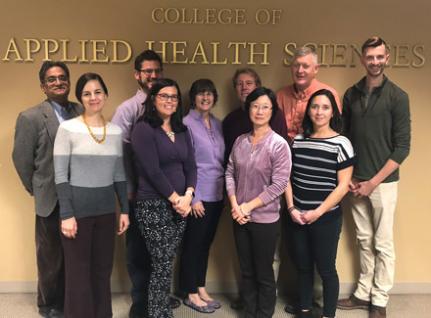
Illinois partners with Georgia Tech on aging technology

By VINCE LARA-CINISOMO
Faculty and staff at the University of Illinois and Georgia Institute of Technology will collaborate on research designed to help people with long-term disabilities age in their homes with support from a five-year, $4.6 million grant from the National Institute on Disability, Independent Living, and Rehabilitation Research.
The funding supports the work of the Rehabilitation Engineering Research Center on Technologies to Support Aging-in-Place for People with Long-Term Disabilities (TechSAge). The mission of TechSAge is to advance knowledge and accelerate development, modification, and testing of technology-based interventions and strategies to promote aging-in-place, a term used to describe individuals aging in the residences of their choice for as long as they are able. Research conducted under the auspices of TechSAge also seeks to reduce secondary conditions among people with disabilities acquired in early to mid-life.
Dr. Wendy Rogers, Shahid & Ann Carlson Khan Professor of Applied Health Sciences in the Department of Kinesiology and Community Health and a TechSAge project director, says current estimates indicate that 40 to 52 million individuals living in the U.S. have some kind of disability and that nearly 17 million adults over the age of 65 have one or more disabilities. That makes the work of TechSAge critical.
“People aging with disability are likely to experience challenges beyond general aging,” she said. “To this point, research has examined issues related to aging and disability separately, under the umbrellas of gerontology and rehabilitation. Bridging the divide will help us better understand the needs of and develop supportive technologies for older adults with long-term sensory or mobility impairments.” She emphasized the importance of technology in facilitating independent living among individuals with long-term disabilities.
The funding will support research examining the needs and technology usage of people with mobility and sensory impairments, including studies of voice-activated digital home assistants and telewellness technologies. It will also support the development of specific technologies that will facilitate aging in place, including a motorized toilet system that adjusts to a user’s functional abilities at any point in time, a multi-component and customizable fall-detection system for use by wheelchair users, and a variety of mobile and voice applications.
In addition to Dr. Rogers at the University of Illinois, Jon Sanford and Dr. Tracy Mitzner of Georgia Tech also serve as center project directors.
The TechSAge team includes the following people at Illinois:
From the Department of Kinesiology and Community Health:
- Dr. Jake Sosnoff, director, Motor Control Research Laboratory
- Dr. Laura Rice, director, Disability Participation & Quality of Life Research Laboratory
- Dr. Lyndsie Koon, postdoctoral research associate, Human Factors and Aging Laboratory
From the Department of Industrial and Enterprise Systems Engineering:
- Dr. Ramavarapu Sreenivas, associate head for graduate studies
- Dr. Kesh Kesavadas, director, Health Care Engineering Systems Center
From the Division of Disability Resources and Educational Services:
- Dr. Jon Gunderson, coordinator, Information Technology Accessibility
From the Center on Health, Aging, and Disability:
- Dr. Jeff Woods, Director
- Dr. Wendy Bartlo, proposal development and outreach specialist
- Dr. Sa Shen, director, Biostatistical Services
Local organizations also will be involved, including Clark-Lindsey Village, the Illinois Community Health and Aging Collaborative, the University of Illinois Osher Lifelong Learning Institute, and OSF Healthcare.
